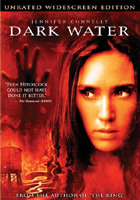 BUY IT AT AMAZON: CLICK HERE!
BUY IT AT AMAZON: CLICK HERE!
STUDIO: Touchstone Home Entertainment
MSRP: $29.99
RATED: Unrated (but really PG-13)
RUNNING TIME: 103 Minutes
SPECIAL FEATURES:
• Deleted Scenes
• "The Sounds of Terror" featurette
• Commentary on selected scenes
• "Beneath the Surface: The Making of Dark Water"
• "And Extraordinary Ensemble" featurette
Pete Hammond, film critic for Maxim Magazine, has
a quote right on the front of the Dark Water DVD release. It
says, in full: "Even Hitchcock could not have done it better."
Jennifer Connelly is eyeing the quote with some trepidation, and my perfectly
natural first response was: "Does Ms. Connelly suspect Mr. Hammond is
lying, too?" Maybe Mr. Hammond’s quote was taken out of context; maybe the
entirety of the blurb states that Dark Water is such a mess that
not even a director of Hitchcock’s caliber could have fixed it.
Sadly, this is not the case.
really did like Dark Water that much. So, rather than criticizing
the critic, I suppose I will dig at the film itself, with all the implications
falling as they may.
The Flick
Dark Water is based on the 2002
Japanese film of the same name (translated) which, in turn, was based on a
novel by Koji Suzuki, who also authored the novel that Ringu adapted,
as well as its continuity-challenged sequels and prequels. This isn’t a
pedigree; it’s a cluster fuck, so, naturally, there’s a bit of gene-sharing
going on. From its sopping-wet cinematography to its directionless musings on
motherhood, Dark Water is familiar territory for anyone who has
seen either the Japanese or American versions of Ringu, with one
small difference: Ringu was intended to be horror, and Dark
Water can’t decide if it’s a drama or a melodrama.
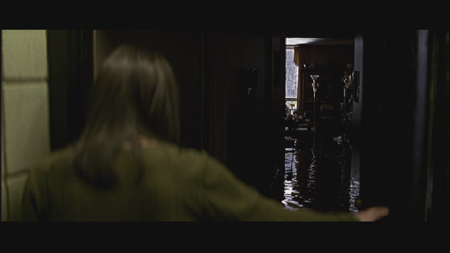
Well, it’s dark, and there’s water, so…
Jennifer Connelly plays Dahlia, recently
separated from her husband and trying to work out a way of keeping custody of
her young daughter. Dahlia is forced to move out of the apartment she shared
with her husband and into something with a bit lower rent. A scummy little
building on
like just the thing, but a persistent leak in the ceiling of their apartment
and an oppressive, settling dread threaten to drive the ladies away.
For all the dream-logic horror — in which Dahlia
is more observer than participant — the story is more concerned with the
melodrama surrounding the divorce. Just to clarify, melodrama is a form of
narrative in which, broadly speaking, the situations are more important than
the characters. Melodramas use the interaction of events to give their stories
momentum, where dramas are involved with the characters and use events to further
characterization.
Sometimes the two genres can blend well; think Blade
Runner, in which the situations drive the story, but wouldn’t stand on
their own without the uniqueness of Deckard’s character. In Dark Water,
however, the genres push and pull at each other, and never cooperate. It’s
especially bad when horror comes over to visit, and instead of a threesome,
they end up staring awkwardly at each other over a half-drunk bottle of
whiskey. The disparate elements don’t support each other; they fight for
supremacy.
Part of the trouble stems from the fact that
Jennifer Connelly and John C. Reilly (and, to a lesser degree, Pete Postlethwaite
and Tim Roth) are such damn fine actors. They give it their all, but, strangely
enough, their all is way too much. Their roles are far too flimsy to be
elevated by fine acting; they just fall apart at higher altitudes. There’s not
enough meat on the skeleton plot to justify their efforts and even Reilly, with
his twist on the lovable schlub role, can reasonably be accused of overacting.
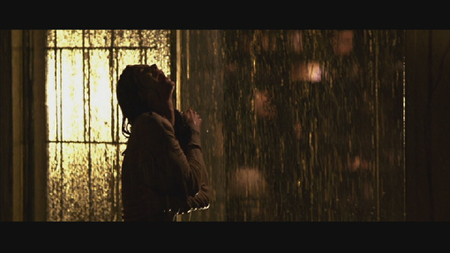
When Woton pours his blessings out on you, it stings.
If Dark Water were a drama, it
would have needed such fine acting. If it were a melodrama, it would have
needed tight, tense direction. Walter Salles is a competent man behind the
camera, but his communication of dread and fear borrow too heavily from the
established modes of the horror convention, and his pacing is too convoluted to
lend any weight to dramatic side of the story.
Speaking of pacing: a combination
horror-drama-melodrama like this needs to hum along at a good clip, in part to
smooth over the lumps and in part because there’s nothing worth dwelling.
Salles and his editor are far too deliberate in the way they unfold the plot.
It’s almost as if Salles is slowly opening a Christmas gift, when everyone just
wants him to tear at the paper, and then he triumphantly displays that the box
is empty.
Characterizing directors is one of my favorite
things in the world.
In addition to the awkward plot progress, there
are some flashbacks that are almost completely unnecessary, and the ending is
telegraphed within the first ten minutes of the flick. Those sorts of things
really snap an audience out of the mood.
Clichés do a pretty darn good job of it, too.
This is going to be a slight digression, but it applies completely to Dark
Water. Please, please, directors of horror the world over, stop
fronting prodigious children in your films. It may be an appeal to something
common in humanity — the instinctive desire to protect children, maybe — but
it is overused and thus lacks any sort of punch. I suspect that initially they
had an impact because our fascination extends into their innocence and the
destruction of it, kind of like William Blake’s matched collections "Songs
of Innocence" and "Songs of Experience". The poor, tortured
children get an exaggerated coming-of-age lesson by having their innocence
raped, but it has lost all power in the modern setting because of repetition.
It’s also yet another of the bits of shared DNA
between Dark Water and The Ring. The structure of
the former borrows significantly from the latter, in that the threat seems to
have been dealt with, but then, oh no! the danger isn’t over yet! It’s a
lengthening of the last-minute jump scares of the good old days. When it is
employed to sustain tension, it kind of works; the conclusion of Dark
Water exists to tie up plot threads that didn’t need to be woven in the
first place, and so abandons all hope at thrills.
Dark Water is aimless and pretty,
kind of like that girl you knew in school who needed to find a hobby, quickly,
before she ended up forgotten in the back of some jock’s Volkswagen. I dunno; I
guess that look appeals to some people.
6 out of 10
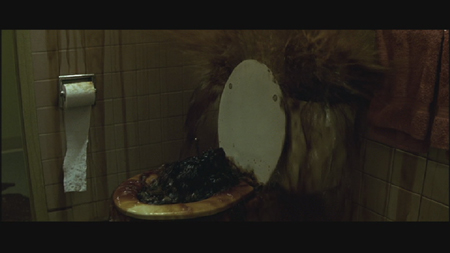
Danny Boyle’s got a rival.
The Look
The suitably dank cinematography is in anamorphic
widescreen. The transfer is very crisp, but the limited palette is wearying.
Details come through clearly, despite the generally low level of light, and the
blacks seem to have been deliberately tinted green, just a touch, to mesh with
the ambient light. Rather than looking washed out, this contributes to the
overall effect.
One niggling detail I’ve got to cover is the
representation of the color of the titular water. As a connection to the
backstory of the film, it’s supposed to be something black, something that
carries the suggestion of evil, and the dye and color processing used just make
it look rusty, as if at any moment a Goonie is going to declare his desperate
thirst.
7 out of 10
The Noise
The Dolby digital 5.1 track is more than decent.
One of the successes of the film is in its sound design, which features a
massive number of effects, most of which are used with great subtlety. Water
drips, floors echo, rain comes down in white noise, and it’s all represented
beautifully. The balance between music and dialogue is just right, though the
music is incredibly dull.
My only complaint is that the disc doesn’t make
great use of the rear channels, except when conveying an effect that occurs
above the edge of the frame. Otherwise, most everything is fronted and just
duplicated in the rear.
8 out of 10
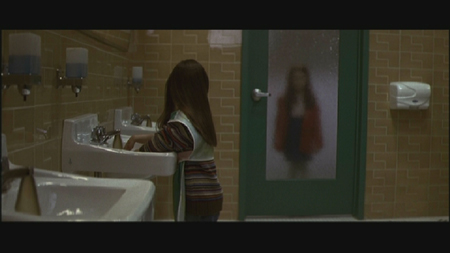
"I’ll right there, just after this glaring continuity error!"
The Goodies
Why is this an unrated edition? As near as I
could tell from my research, nothing has been altered in the cut of the film.
None of the bonus materials speak to a re-edit. My suspicion is that it’s to
silence the naysayers who seize upon any opportunity to bash PG-13
"horror".
Anyway, our thin list of bonus features includes
a behind-the-scenes featurette called "Beneath The Surface" in which
the filmmakers talk at length about their intentions to avoid making a horror
film, which, as they say it, is a noble goal. It’s a fine idea, challenging The
Ring‘s established audience with a more subdued story, but the film
fails to live up to the filmmakers’ perceptions of their creations.
There’s a featurette about the sound design
called "The Sound of Terror", which is actually well worth the
watching, because, as I mentioned above, the sound design is the film standout
feature. The sound technicians speak, briefly, about their recurring motifs,
and their attempts to encourage subliminal fear from the audience.
Two deleted scenes are included (is this what
makes the DVD qualify as unrated?) Neither of them are interesting, because
both are throwaway character moments.
The fine cast is examined in the "An Extraordinary
Ensemble" featurette. The actors are given a chance to ruminate on their
participation in the film, and the casting directors talk about how they wanted
Dark
Water to mirror Rosemary’s Baby in the choice of
Oscar-caliber actors, and they certainly scored in that regard. (Also, look out
for the fuzzy math segment in which a film is determined to have about seven
halves.)
Finally, a couple of key sequences are given with
filmmaker commentary in the "Analyzing Dark Water" featurettes. You won’t
get any insights from these brief segments, except that the fumbling of the
editing in the conclusion is addressed directly (if unsatisfyingly).
6 out
of 10
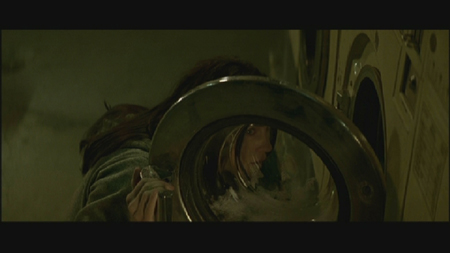
That’s what the world looked like to me all the time before I got contacts.
I was hit a lot.
The Artwork
Apart from Ms. Connelly’s wary glance at the
questionable review blurb, there’s not much to say about this artwork. It’s
bland — red for the widescreen, blue for the crapscreen. There’s also a
potential spoiler in one corner.
While staring at it, trying to think of something
else to say, I noticed that the Hitchcock blurb overlays a shot from the film
ripped directly from Psycho. That about does it for Dark
Water.
5 out of 10
Overall: 5.5 out of 10